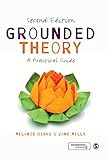Grounded theory : a practical guide
Material type: TextPublication details: New Delhi Sage 2015Edition: 2ndDescription: 198 pagesISBN:
TextPublication details: New Delhi Sage 2015Edition: 2ndDescription: 198 pagesISBN: - 9781446295779 (hbk.)
- 144629577X (hbk.)
- 1446295788 (pbk.)
- 9781446295786 (pbk.)
- 300.721 BIR
| Item type | Current library | Collection | Shelving location | Call number | Materials specified | Status | Notes | Date due | Barcode | |
|---|---|---|---|---|---|---|---|---|---|---|
 Books
Books
|
BMU Library | Reference | 2-E | 300.721 BIR (Browse shelf(Opens below)) | Not For Loan | SOM | 8733 |
Browsing BMU Library shelves, Shelving location: 2-E, Collection: Reference Close shelf browser (Hides shelf browser)

|

|

|

|

|

|

|
||
| 300.72 WHE Visualizing social science research : maps, methods, & meaning | 300.72 WHI Diverse Issues in cultural and social sciences | 300.721 BIR Grounded theory : a practical guide | 300.721 BIR Grounded theory : a practical guide | 300.721 FLI Introducing research methodology : a beginner's guide to doing a research project | 300.721 FLI An introduction to qualitative research | 300.721 GIR Research methodology for social sciences |
This highly practical book introduces the whole range of grounded theory approaches, providing a comprehensive description of the strategies and techniques employed in this methodology. Unlike most existing books in this area, it is not written from a particular philosophical standpoint, and is the ideal first introduction for any student or researcher looking to use grounded theory in their analysis for the first time. Birks and Mills' accessible and highly-readable text is driven by practical case examples throughout to help the reader get to grips with the process of doing grounded theory analysis for themselves. The book deploys a variety of educational activities to guide readers through both the principles and the application of grounded theory, making this an ideal starter text for those new to the approach. This updated second edition: guides the reader through each step of the grounded theory process clearly explains how to memo effectively, using examples includes a chapter which explains the difference between data generation and collection features information on how to use digital resources to manage data discusses the philosophy and ethics of grounded theory within the qualitative paradigm. -- Provided by publisher
There are no comments on this title.

